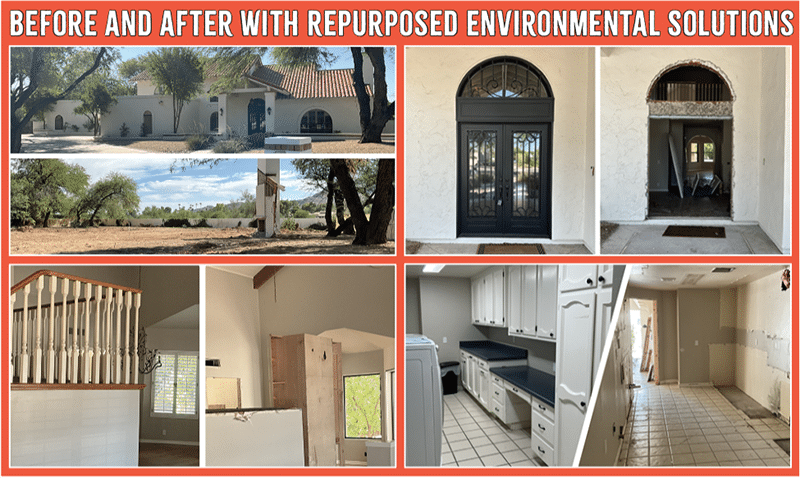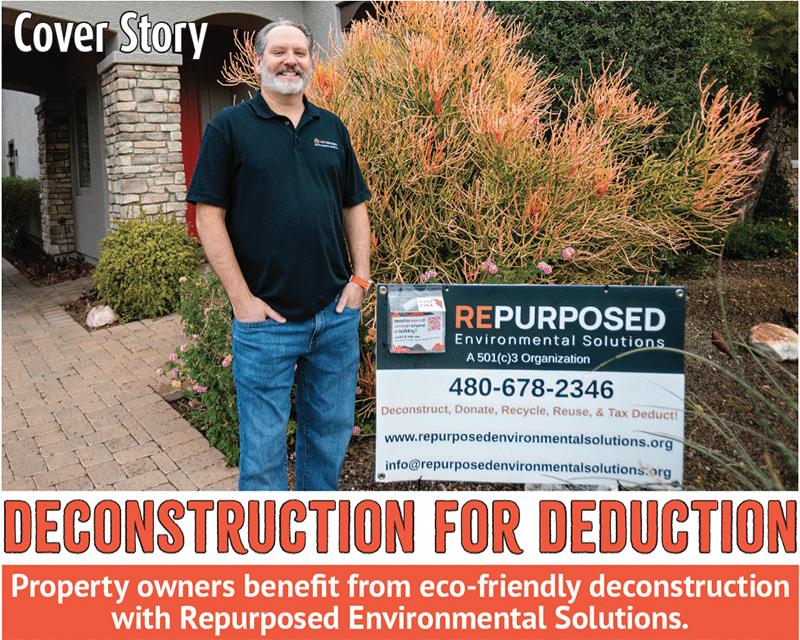By Sondra Barr
In a world increasingly attuned to the principles of sustainability and environmental stewardship, Repurposed Environmental Solutions (RES) emerges as a pioneer. This 501(c)(3) nonprofit organization, operating across Arizona, California, Oregon, and Washington, champions a mission to significantly reduce waste in the building industry by reimagining the fate of construction materials. Through the visionary leadership of Executive Director Devin Schulte, RES excels in the deconstruction of buildings, ensuring that materials destined for oblivion are instead salvaged, repurposed, and given a new lease on life.
Central to RES’s innovative approach is a blend of environmental mission and financial incentive. By leveraging guidelines established by the IRS in 1922, which were designed to encourage the recycling of building materials, RES provides property owners the opportunity for financial return in the form of tax deductions for donating reusable materials. “We utilized the IRS’s guidelines and put it into a business to streamline their process,” explains RES Office Manager Vanity Delgadillo.
The process of deconstruction at RES is closely tied to the IRS’s stringent appraisal requirements, ensuring that property owners receive accurate valuations for their donations. This is facilitated by independent IRS qualified appraisers, whose expertise and certification standards are rigorous. “The minimum requirement for IRS qualified appraisers is a base of 20-plus years and so many certifications,” Delgadillo says, highlighting the thoroughness of the valuation process.
RES’s projects vary widely, from modest 800-square-foot renovations to large-scale 26,000-square-foot commercial demolitions. Regardless of size, each project is underpinned by the organization’s commitment to diverting reusable materials from landfills. This not only encompasses a wide range of materials—from concrete and metal to cabinets and windows—but also involves meticulous deconstruction techniques that prioritize the preservation of these items for future use for organizations such as Habitat for Humanity, Stardust Building Supplies, and others.
This process is streamlined into four straightforward steps, ensuring that each project is handled with the utmost efficiency and care.
Step 1: Initial Contact and Appraisal Planning
After reaching out to RES to express interest in their deconstruction services, RES explains the process to property owners and directs them to an IRS qualified appraiser for a walk though. This initial evaluation is key to understanding the potential tax benefits and setting the stage for a successful project.
Step 2: Scope of Work and Contract Agreement
Following the appraisal, the next step involves a detailed discussion on the scope of work. This includes determining the extent of deconstruction required, whether it’s a full building teardown or a selective deconstruction focusing on specific elements. A contract is then drawn up and signed, and the project is officially scheduled. This step ensures that both parties have a clear understanding of the work to be done, timelines, cost, and expectations.
Step 3: Deconstruction and Donation
With the groundwork laid, RES then proceeds with the deconstruction process, carefully dismantling the structure to salvage reusable materials. These materials, which range from structural elements to fixtures, are then prepared for donation or recycling. This step is where RES’s mission comes to life, as materials are diverted from landfills and given a second chance at usefulness, embodying the principles of sustainability and waste reduction.
Step 4: Paperwork and Donation Packet
The final step in the process underscores RES’s commitment to providing a comprehensive service. Once the project is completed and all reusable materials have been accounted for, RES finalizes all records related to the deconstruction and donation. Property owners are then provided with a donation packet, which includes all the necessary documentation for tax deduction purposes. This step not only signifies the completion of the physical work but also the financial and administrative closure of the project, offering clients peace of mind and the satisfaction of contributing to a more sustainable future.
What sets RES apart in the competitive landscape is not just its mission to protect the environment but also its operational excellence. The organization’s deconstruction services are marked by quality craftsmanship, experienced crews, and competitive pricing, ensuring that property owners receive both environmental and financial benefits.
The work of Repurposed Environmental Solutions in the realm of sustainable deconstruction is not only reshaping the industry but also providing a model for how environmental stewardship and financial incentives can work hand in hand. Central to their success is the understanding that each property is unique, with its value intricately tied to the real estate market’s dynamics. As Schulte emphasizes, the variability in properties underscores the bespoke nature of their work: “It’s all based on a real estate appraisal. No two houses are exactly the same or have the same value. It really is just all the information that the appraiser takes in and then they come up with a formula that gives it a salvage value.”
This meticulous attention to detail and commitment to personalized service ensure that each project not only contributes to reducing landfill waste but also maximizes the benefits for property owners. Through their innovative approach and dedication, Repurposed Environmental Solutions is a model for sustainable practices to transform our built environment, one deconstructed building at a time.
For more information, visit repurposedenvironmentalsolutions.org.

This content is sponsored by Repurposed Environmental Solutions.





